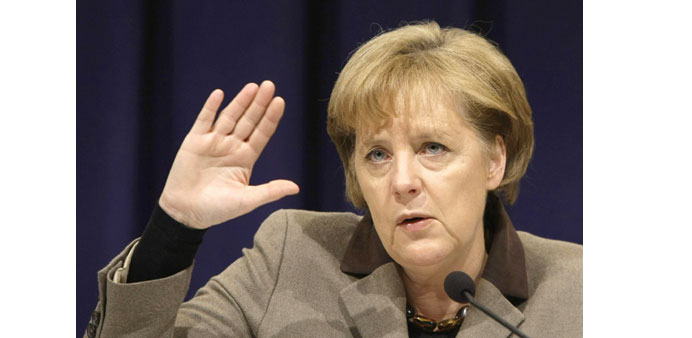DPA
Berlin
Chancellor Angela Merkel said yesterday that she wants to examine plans for a sweeping reform of Germany’s immigration laws proposed by one of her coalition partners while rejecting talk of a split in her government on the issue.
“I have to first form an opinion,” she said about the Social Democratic Party’s (SPD’s) call to introduce a points system for those seeking to immigrate to Europe’s biggest economy. “Now let’s see what we can do in relation to immigration.”
The immigration reform plan “is not part of our coalition agreement, so this means there is no dispute”, the chancellor said.
But she acknowledged the problems caused by the increasing number of refugees arriving in Germany, especially for regional governments, saying the issue was high on Berlin’s agenda.
Thomas Oppermann, who leads the SPD in the lower house of parliament, prepared a paper on a new immigration law similar to Canada’s points-based system to attract hundreds of thousands of skilled workers to Germany.
Oppermann said Germany needs 300,000 to 400,000 skilled immigrants each year.
“This points system is not necessary to attract workers to Germany,” said Michael Grosse-Broemer, the politician in Merkel’s Christian Democratic Union (CDU) responsible for relations between the coalition partners.
“We don’t need a new law,” he said. “We have a good immigration law. We could, however, reform the existing one.”
Interior Minister Thomas de Maiziere, also of the CDU, said yesterday that that there was no need for a new law.
Immigration has re-emerged as an issue in Germany after a recent push for measures to control a migrant influx that has been spearheaded by two populist, right-wing groups: the Alternative for Germany (AfD) and the anti-Islamist movement PEGIDA.
The AfD has been chipping away at support for the major political parties with opinion polls showing it could enter parliament at the next election in 2017.
Canada is not a good example for regulated migration, Grosse-Broemer argued, saying that the country had just changed its points system and rejected changes in line with Germany’s own residence law.
The German residence law, which requires proof of a job among other measures, offers the best opportunities for immigration, Grosse-Broemer said.
The CDU politician agreed that Germany desperately needs skilled workers, but he pointed to the fact that industrial associations are happy with the law as it is.
CDU general secretary Peter Tauber had called for a new immigration law at the start of 2015, but Grosse-Broemer denied yesterday that there is any conflict within the CDU over the issue.
The CDU and its Bavarian sister party, the Christian Social Union, are more concerned about improving the existing rules as well as better integration of foreigners than introducing a new law.
Yesterday German police reported a spike in illegal immigration into Germany with 57,000 cases recorded in 2014, a 75% increase on the previous year.
Meanwhile, 2.3mn checks were carried out for undocumented immigrants at the country’s borders in 2014, and 30,000 attempted illegal entries into Germany were uncovered, up from 17,000 in 2013, police said.
The vast majority of the illegal immigrants came from war-torn countries with Syria accounting for 14,029, Eritrea 7,945 and Afghanistan 3,756.

Merkel: let’s see what we can do in relation to immigration.
